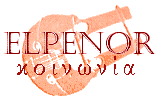Registration is closed. The Forum remains available only as a source of published information.
Author
Topic
charlesasullivan
Canada 8 Posts
Posted - 22 Apr 2013 : 00:16:52
I am trying to translate the following from Michael Psellos 11th century Greek text, but seemed to have hit a number of roadblocks:
George
Greece 615 Posts
Posted - 22 Apr 2013 : 03:48:11
Νυκτάλοπες are people suffering from inability to view daylight well. The disease is called νυκταλοπία.
charlesasullivan
Canada 8 Posts
Posted - 24 Apr 2013 : 00:40:34
Thank you. φέγγους -- my mistake, I put "moon" in my translation but meant "moonlight". However, "light" seems to fit in nicer here. Νυκτάλωπες in this context does not seem to be based on the definition of people suffering from a disease that does not allow them to see daylight well. Stephanus Greek Dictionary has two definitions for this word. One is for not being able to see in the dark, and the other is for the ability to see in the dark, and some especially with the moon. The French picked up on this nuance and have a word derived from it, nyctalope -- an animal with night vision.
Topic
Promote Greek Learning Libraries and Greek Language departments to stimulate your thinking. To refer to a text there published, just copy its url and paste it in your post. ||| Get updates of all Ellopos sites by e-mail. ||| Download Shortcuts for easy access to the Communities - or drag this icon and drop it in the Links bar of your browser :
Best Free Apps
Audio freeware for a powerful, PC based, hi-fi system
The best free antivirus, antimalware and antispyware applications
The best free applications for enjoying Christmas on your desktop
The best free audio converters, even specialized
The best free backup, synchronization and cloning programs
The best free calendars, simple and advanced
The best free cataloguing and directory indexing applications
The best free CD and DVD makers to convert and burn your videos
The best free compression (zip unzip) programs including repair, automation and security tools
The best free desktop clocks and countdown timers, digital or analog
The best free diary, note taking applications and concept map makers
The best free dictionaries and language vocabulary learning tools
The best free educational and mind exercising games
The best free email utilities
The best free encryption programs to secure your files
The best free file and folder search tools, simple and advanced
The best free file rename applications
The best free finance management and budget planning applications
The best free flashcard learning systems
The best free font viewers, to test, install and uninstall your fonts
The best free FTP clients and servers
The best free image converters, resizers and watermark embedders
The best free image editors, viewers and animators
The best free image optimizers to reduce file size
The best free image organizers and managers
The best free ISO makers, readers, burners, converters, extractors and mounting assistants
The best free keyboard tools to remap, customize and enhance your keys
The best free Laptop utilities
The best free measurement unit converters
The best free media players
The best free morph and animation programs and tools
The best free mouse utilities
The best free mp3 utilities, trimmers, playlist editors
The best free MS Word productivity macros
The best free organizers, task managers and reminder programs
The best free password managers, auto fillers and rescuers
The best free pdf editors and tweakers
The best free personal health and diet applications
The best free photo album, slide show and gallery makers
The best free Post It Sticky notes programs, simple or advanced
The best free privacy applications
The best free programs for music composition and education
The best free programs to recover deleted or damaged files
The best free registry editors, optimizers and backup makers
The best free screen saver utilities
The best free simple text editors and Notepad replacements
The best free sound editors
The best free subtitle editors
The best free torrent programs
The best free utilities to move, arrange, resize windows, even in a multiple monitor setup
The best free video converters
The best free video cutters and joiners
The best free wallpaper changers and managers
The best free web search programs and utilities
The best free Winamp plugins, tools and skins
The best free Windows calculators, simple or scientific, even specialized
The best free Windows tweakers and optimizers
The best freeware to retouch and handle your pictures
Top-priority free Windows utilities




